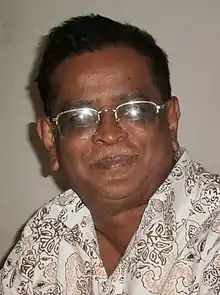Kothao Keu Nei
Kothao Keu Nei (Bengali: কোথাও কেউ নেই, English: No one is anywhere) is a Bangladeshi drama television series written by Humayun Ahmed, which aired on Bangladesh Television from 1990 to 1991. The series is about the struggles of a gangster named Baker Bhai.It was adapted from the book of the same name.[1]
| Kothao Keu Nei | |
|---|---|
 The cover of the original novel | |
| কোথাও কেউ নেই | |
| Genre | Drama |
| Based on | Kothao Keu Nei by Humayun Ahmed |
| Written by | Rahat Ahmed |
| Directed by | Barkatullah |
| Starring | Cast |
| Theme music composer | Maksud Jamil Mintu |
| Opening theme | Maksud Jamil Mintu |
| Composer | Maksud Jamil Mintu |
| Country of origin | Bangladesh |
| Original language | Bengali |
| No. of seasons | 1 |
| No. of episodes | 30 |
| Production | |
| Producers |
|
| Cinematography |
|
| Editor | Mosharraf Hossain |
| Running time | 20-22 minute |
| Release | |
| Original network | Bangladesh Television |
| Original release | 1990 – 1991 |
Kothao Keu Nei gained intense popularity, mainly due to the lovable rogue Baker Bhai, who grew into one of the beloved fictional characters in Bangladesh.[2] It is considered as one of the best tv-series and a house staple of every Bangladeshi in the 90's cable-tv era.[3][4][5] It is also considered one of the finest works of Humayun Ahmed till date.[6][7] The series had a huge impact on the fans that they started protesting on the streets after the unjustified death of the protagonist (Baker Bhai).[8]
Plot
The central character of the series was "Baker Bhai". He was a gangster, and his companions were "Badi" and "Majnu"; all three used to travel on motorcycles. Most of the time, Majnu drove the motorcycle, Badi sat behind, Baker Bhai sat in the middle. Baker Bhai had a penchant for twisting a chain over and over on his index finger, turning it around, unfastening it, and refastening it. He was often seen doing this when there was no active dialogue. Baker Bhai liked 'Muna.' Muna is a girl from a lower-middle-class family. She works and takes care of her cousins. And she had a love affair with an unemployed youth named Mamun. Even though Baker Bhai was the gangster of the area, most of the people loved him because he was a worshiper of truth - he did not hesitate to stand by the side of oppressed people, as well as he did not accept the injustice of the society with his face, he suppressed it with his goons. In the course of events, Baker Bhai conflicts with an influential woman in the area named Rebecca Haque. The woman indulged in illegal activities in her house; Baker Bhai protested after finding out. Baker Bhai called her 'Kuttawali' because this powerful woman used to keep dogs in her house. In the meantime, the gatekeeper of Rebecca Haque was murdered in his house in the dark of night. Baker Bhai is blamed for the murder, and newly-arranged witness of Rebecca Haque, Moti, the new robber of the area, testifies as a witness. Although Baker Bhai's lawyer was handing over Moti's false testimony to the court, in the meantime, Rebecca Haque got hold of Baker Bhai's partner Badi by showing greed to frame Baker Bhai. Badi becomes desperate and subtly frames Baker Bhai by swearing false testimony in court. The court sentenced Baker Bhai, innocent of the murder, to death based on false testimony. The lawyer tried until the last moment to advocate for Baker Bhai but failed. Muna was devastated by this decision of the court.
Meanwhile, everyone in Muna's house also migrated to different places. On this solitary day, early one morning, in the semi-darkness, The police took Baker Bhai's body out through the prison gate while the Fajr call was being sounded all around. There was no one to accept the body except Muna. After the cremation, Muna grew up alone. As if he had no one left anywhere. Living up to the play's name, Muna stands alone in the wilderness in the series's last scene; the dawn's light is a shadow in the darkness.
Cultural impact
After the unjustified death of the protagonist, protests broke out everywhere; fans brought demonstrations.
Letters and petitions urged Ahmed not to kill off Baker Bhai. But Ahmed stuck to his storyline, and Baker Bhai was hanged. For years afterward, special prayers were held in many localities to pray for the departed soul of this fictional character.
Ahmed was quite perturbed by this public agitation over Baker Bhai's hanging.
''So many people are hanged for no good reason, so many people die by the roadside and there is hardly any public headache over these. Yet, here was a fictional character being hanged and the public are up in arms. I was quite taken aback by all this," Humayun Ahmed told the BBC.[9]
Cast
- Asaduzzaman Noor as Baker Bhai[10]
- Abdul Kader as Bodi
- Lutfur Rahman George as Mojnu[11]
- Suborna Mustafa as Muna[12]
- Mozammel Hossain as Shawkat
- Lucky Enam as Latifa
- Afsana Mimi as Bokul
- Shila Ahmed as Lina
- Titu as Babu
- Masud Ali Khan as Muna's grandfather
- Shahiduzzaman Selim as Bokul's husband
- Nazma Anwar as Bokul's mother-in-law
- Mahfuz Ahmed as Moti[13]
- Khairul Alam Sabuj as Mamun
- Bijori Barkatullah as Ira
- Shamsuzzaman Khan Benu as Baker's Brother
- Rubina as Baker's Sister-in-Law
- Masuda Sharfuddin as Rebecca
- Selina Mahbub Trishna as Ruma
- Hosne Ara Putul as Jhuma
- Tamalika Karmakar as Shuma[14]
- Saleh Ahmed as Chan Miah
- Humayun Faridi as the lawyer of Baker Bhai and Shawkat
- Abul Khair as the lawyer of Rebecca
- Nazmul Huda Bachchu as a colleague of Muna
References
- "Kothao Keu Nei (1990)". The A.V. Club. Retrieved 24 May 2023.
- "Why Baker Bhai's popularity skyrocketed". The Financial Express. Retrieved 2 September 2021.
- "Asaduzzaman Noor: When we made Kothao Keu Nei, we didn't realize it would be so widely accepted". Dhaka Tribune. 30 October 2019. Retrieved 24 May 2023.
- "Kothao Keu Nei remains ageless". New Age | The Most Popular Outspoken English Daily in Bangladesh. Retrieved 24 May 2023.
- sun, daily. "Devolution of dramas | Daily Sun |". daily sun. Retrieved 24 May 2023.
- Ferdous, Fahmim (13 November 2013). "He who told the best tales ..." The Daily Star. Retrieved 24 May 2023.
- "Bangladesh's most enduring storyteller". BBC News. 20 July 2012. Retrieved 24 May 2023.
- zooit (25 December 2019). "The Top 5 TV Series In Bangladesh". Zoo Travel Technology. Retrieved 10 January 2023.
- "Bangladesh's most enduring storyteller". BBC News. 20 July 2012. Retrieved 10 January 2023.
- "Noor-Suborna on BTV after 26 years!". The Daily Star. 9 September 2016. Retrieved 13 December 2017.
- "Lutfur Rahman George opens up about television, films and more". The Daily Star. 6 September 2019. Retrieved 6 September 2019.
- "Actors recall Humayun Ahmed". The Daily Star. 13 November 2012. Retrieved 13 December 2017.
- "A Taste of Success". The Daily Star. 10 January 2011. Retrieved 13 December 2017.
- "THE FIVE GENERATIONS OF TV HEROINES". The Daily Star. 31 October 2014. Retrieved 13 December 2017.
